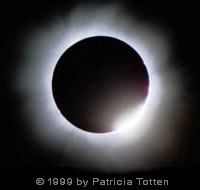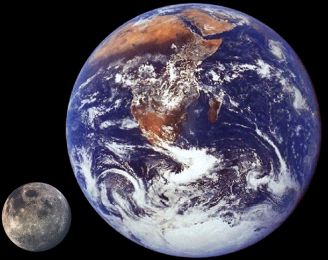Earth and Moon to Scale
1 pixel = 600 kilometers

The average distance between Earth and Moon is approximately 30 times
Earth's diameter.
If you could fly to the Moon at a constant speed of 1000 kilometers per hour,
which is the speed of a fast passenger jet, it would take sixteen days to get
there. Apollo astronauts reached the Moon in less than four days even though
they coasted "uphill" almost the entire distance. They got a fast start.
 The Sun happens to be 400 times the Moon's diameter, and 400 times as
far away. That coincidence means the Sun and Moon appear to be the same
size when viewed from Earth. A total solar eclipse, in which the Moon is
between the Earth and Sun, blocks the bright light from the Sun's
photosphere, allowing us to see the faint glow from the corona, the
Sun's outer atmosphere.
The Sun happens to be 400 times the Moon's diameter, and 400 times as
far away. That coincidence means the Sun and Moon appear to be the same
size when viewed from Earth. A total solar eclipse, in which the Moon is
between the Earth and Sun, blocks the bright light from the Sun's
photosphere, allowing us to see the faint glow from the corona, the
Sun's outer atmosphere.
When the Moon is at apogee, it is 11% farther from Earth than it is
at perigee. This is far enough that it cannot entirely block the bright
light, so eclipses which occur near apogee are not total.
| | | |
 |
| Perigee | | 363,300 km |
| Mean | | 384,400 km |
| Apogee | | 405,500 km |
| |

Gravitational interaction (tides on the Earth caused by the Moon)
transfers kinetic energy from Earth to the Moon, slowing Earth's
rotation and raising the Moon's orbit, currently at a rate of
3.8 centimeters per year.
Earth and Moon Compared
The Moon has approximately 1/4 Earth's diameter, 1/50 Earth's volume,
and 1/80 Earth's mass. Earth is very dense overall (it is the densest
planet in the Solar System), but the Moon is light for its size. The
difference is partly because Earth has a large core of iron and other
heavy metallic elements, while the Moon has only a small core, if it
has a core at all. The Moon's surface gravity is 1/6 of Earth's, and
escape velocity from the surface is about 1/5 of Earth's.
The Moon's surface is covered with rock and grit that are mostly
dark-gray minerals, so it reflects light poorly compared to Earth,
which always has highly-reflective clouds. The Moon reflects visible
light about 1/3 as well as Earth, and because of its much smaller size,
has a visual brightness less than 1/40 that of Earth, when both are
fully illuminated and seen from the same distance -- a difference of
four stellar magnitudes.

| Earth | Moon |
| Mean diameter | 12,742 km | 3,476 km |
| Volume | 1.08321 x 1012 km3 | 2.199 x 1010 km3 |
| Mass | 5.9736 x 1024 kg | 7.349 x 1022 kg |
| Mean density | 5.515 | 3.342 |
| Surface gravity | 9.78 m/s2 | 1.62 m/s2 |
| Escape velocity | 11.2 km/s | 2.38 km/s |
| Visual albedo | 0.367 | 0.12 |
| Visual magnitude | -3.86 | +0.21 |
At right: Earth and Moon to the scale of 1 pixel = 50 km.
The Moon's surface area is a bit greater than Africa's.
 To my Space and Science home page
for more about the Moon and planets
To my Space and Science home page
for more about the Moon and planets
Jeff Root
February 18, 2003
 The Sun happens to be 400 times the Moon's diameter, and 400 times as
far away. That coincidence means the Sun and Moon appear to be the same
size when viewed from Earth. A total solar eclipse, in which the Moon is
between the Earth and Sun, blocks the bright light from the Sun's
photosphere, allowing us to see the faint glow from the corona, the
Sun's outer atmosphere.
The Sun happens to be 400 times the Moon's diameter, and 400 times as
far away. That coincidence means the Sun and Moon appear to be the same
size when viewed from Earth. A total solar eclipse, in which the Moon is
between the Earth and Sun, blocks the bright light from the Sun's
photosphere, allowing us to see the faint glow from the corona, the
Sun's outer atmosphere.




 To my Space and Science home page
To my Space and Science home page